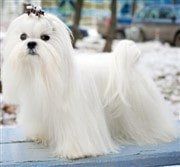Maltese Dental Care
Cleaning and Common Issues
Overview
Taking care of a dog's teeth is vital for good health, yet is sadly overlooked by many owners.
Often, owners only take note once a dental issue has developed. For this reason, you'll want to start your Maltese on an at-home preventative dental care program as soon as possible, and bring him for professional care as needed.
This section will discuss steps you can take to help prevent tooth decay and keep your Maltese's teeth healthy.
We will also discuss some common problems and what is involved with taking your dog in for a 'full dental' at the veterinarian's office.
The saying of 'an ounce of prevention is worth a pound of cure' never held so true than in regard to a dog's oral health.
Please note: PetMaltese is reader-supported. Some of the product suggestions on this page are affiliate links. As an Amazon Associate we earn from qualifying purchases. This is at no extra cost to you and helps us continue creating useful content.
Milk Teeth
The 28 milk teeth, also known as deciduous, baby, or puppy teeth, start to erupt from gums at the 3-week mark and are generally fully emerged by the 8-week mark.
These will begin loosening and falling out starting at the 3.5 to 4.5 month mark for the Maltese breed.
This is known as the teething phase
in which the 28 deciduous are replaced by 42 permanent adult teeth.
Though a Maltese puppy's milk teeth are temporary, you will still want to provide at-home dental care.
This is because what you do at the puppy stage sets the foundation for the rest of your Maltese's life.
Taking care of the teeth helps a pup become accustomed to the routine care he will need as an adult, and will work to keep gums healthy for his adult set.
Why Keeping a Maltese's Teeth Clean is Important
When your Maltese is done teething, he will have 42 tiny adult teeth. Hopefully, you have already been taking care of his teeth and keeping them clean; he will need them forever. However, it is never too late to start.
If teeth are not kept clean, quite a bit can happen.
Here are some facts to know:
- All day - around the clock - plaque is being produced. It is a clear, sticky substance that clings to teeth.
- If it is not cleared away it will begin to harden into tartar. This process may begin in as little as 3 days. Tartar often has a yellow or brown tint, and is even more difficult to remove then plaque.
- Both plaque and tartar eat away at any enamel surface that they come into contact with.
- It can, and often does, travel under the gum line, where it is out of sight but very destructive.
- As tooth decay is slowly causing teeth to rot, infection can set in. This can be an abscess and/or infection can spread up to the sinuses or even cause a full-body sepsis infection that can reach vital organs.
- Periodontal disease, which includes both gingivitis (gums are in a weakened state with inflammation and reddening) and periodontitis (loss of bone and soft tissue around the teeth) is a top concern.
- Decayed teeth will eventually rot to such a degree that they loosen and fall out.
- Needless to say, all of this comes with a good amount of pain, and an older dog that is missing teeth will have trouble eating. Inability to chew food is a top concern for such a tiny breed.
- Chewing on toys is not sufficient enough to keep a dog's teeth properly cleaned. Luckily, there are easy methods that will work.
How to Keep your Maltese's Teeth Clean and Healthy
If you have an adult Maltese and he/she has never had their teeth examined by the veterinarian, you will want to have this done first in order to rule out any current issues. Then, you can start with a clean slate.
No matter if you just obtained a Maltese puppy
or if your adult Maltese has been part of your family for a while, now is the time to get into the habit of caring for the teeth.
There are 3 basic parts to good at-home care:
1. Scrub the teeth. Using a canine paste and an appropriately sized canine toothbrush is one of the most effective ways to help keep a dog's teeth clean.
If you haven't tried doing this before, you may assume that your Maltese won't tolerate it; but, you won't know until you give it a chance. For this, be sure to use a paste that is designed for dogs. Human paste is meant to foam, but this can be a choking hazard for dogs (since they will swallow whatever is in their mouth) and often contains fluoride which is toxic to canines.
There are a couple of options in regard to the toothbrush. Ideally, you'll use a 3-sided brush that reaches all three surfaces of the teeth at the same time. However, some dogs need to work up to this. If so, a fingertip-brush (designed to slip over your index finger) can work well.
The most often you brush, the healthier your Maltese's teeth will be. So, aim to make this part of your dog's regular daily care, with a 3 to 5 minute scrubbing each day.
If you choose this option to clean your Maltese's teeth, the Nylabone Advanced Oral Care Dental Kit
 is a set that contains an effective paste, a 3-sided brush, and a finger-tip brush. Note that for most Maltese under 10 lbs. the 'puppy size' option often works best.
is a set that contains an effective paste, a 3-sided brush, and a finger-tip brush. Note that for most Maltese under 10 lbs. the 'puppy size' option often works best.
2. Or use a dental spray.
This is a good option for dogs that do not tolerate having their teeth brushed and when this is done on a consistent basis, it will remove a good amount of plaque and tartar. As with brushing, using this sort of product regularly will offer the best results.
A good one to try is Spray Me: Doggy Dental Spray
 which is veterinarian approved and made in the USA.
which is veterinarian approved and made in the USA.
3. Offer a daily dental treat.
These are specifically designed to help remove plaque and tartar. This is done via both the consistency of the chew and shape of it. An added plus is ridding a dog of halitosis, to keep breath smelling nice.
A very effective and safe one to try is Virbac C.E.T. VeggieDent Dental Chews . These have been awarded the Seal of Acceptance from the Veterinary Oral Health Council for removing and preventing plaque and tartar.
. These have been awarded the Seal of Acceptance from the Veterinary Oral Health Council for removing and preventing plaque and tartar.
Additionally, these are a safe plant-based chew with no wheat gluten and no animal protein, and are sized nicely for small dogs.
Tips: 1) A quality dental chew will taste great, so this can replace one of your Maltese's normal snacks.
2) These are meant to be hard chews (they have to be to actually work). So, a dental treat should be given when a dog can be supervised in case a piece breaks off.
Full Dentals at the Veterinarian's Office
A 'full dental' consists of a comprehensive dental exam involving x-rays to diagnose any issues, followed by a cleaning, a scraping to remove any plaque or tartar under the gum line, and a rinse. For this, a dog needs to be sedated.
Not all dogs need to have this sort of procedure; it all depends on the state of their teeth. Typically, if this is done one time and an owner is very conscientious about at-home dental care, it may not need to be repeated.
Since at-home care cannot cure an infection or reverse tooth decay, if you suspect that your Maltese is having an issue, you'll want the veterinarian to examine him. Signs include trouble chewing and/or refusing to eat.
For moderate to severe tooth decay, options are extraction or a root canal. Of course, extractions are less expensive, but can affect a dog's bite set. Your vet will discuss the pros and cons, and offer his recommendation.
-min-250x250-1920w.jpg)
Specific advice and tips concerning young pups

Issues that can occur; treatment and prevention
Effective methods that can make a world of difference
You May Also Like:
The Best Shampoo and Coat Products for Maltese
- The single layer coat of white hair needs special shampoos and coat care products to keep it snowy white and looking great.

-min-450x169-1920w.jpg)
-min-335x335-1920w.jpg)






